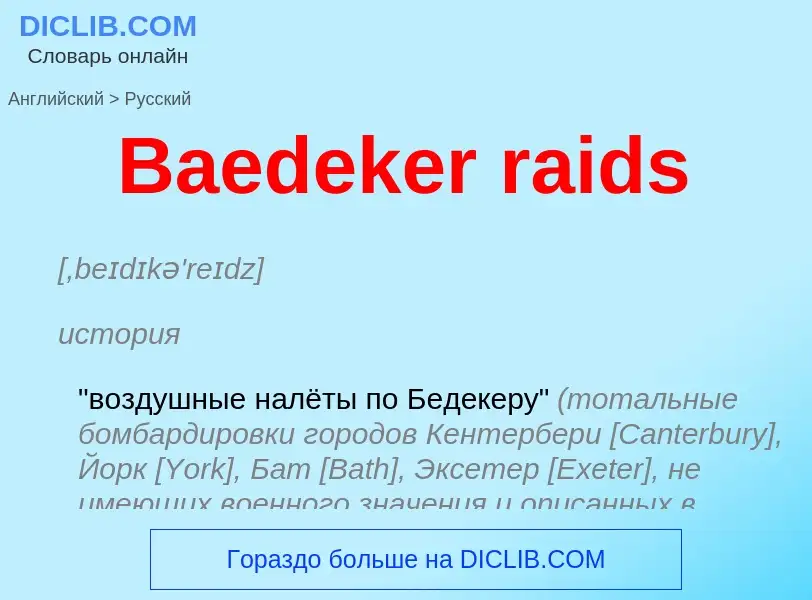Перевод и анализ слов искусственным интеллектом ChatGPT
На этой странице Вы можете получить подробный анализ слова или словосочетания, произведенный с помощью лучшей на сегодняшний день технологии искусственного интеллекта:
- как употребляется слово
- частота употребления
- используется оно чаще в устной или письменной речи
- варианты перевода слова
- примеры употребления (несколько фраз с переводом)
- этимология
Baedeker raids - перевод на русский
[,beɪdɪkə'reɪdz]
история
"воздушные налёты по Бедекеру" (тотальные бомбардировки городов Кентербери [Canterbury], Йорк [York], Бат [Bath], Эксетер [Exeter], не имеющих военного значения и описанных в немецком путеводителе Бедекера как исторические и архитектурные памятники; бомбардировки проводились немецкой авиацией в 1942)
['beidəkə]
существительное
общая лексика
Бедекер (название путеводителей по разным странам для путешественников, туристов)
путеводитель по историческим местам, бедекер
Определение
Википедия
The Baedeker Blitz or Baedeker raids was a series of aerial attacks in April and May 1942 by the German Luftwaffe on English cities during the Second World War. The name derives from Baedeker, a series of German tourist guide books, including detailed maps, which were used to select targets for bombing.
The raids were planned in response to a devastating increase in the effectiveness of the Royal Air Force's (RAF) bombing offensive on civilian targets after the Area Bombing Directive (General Directive No.5 (S.46368/111. D.C.A.S), starting with the bombing of Lübeck in March 1942. The aim was to begin a tit-for-tat exchange with the hope of forcing the RAF to reduce their attacks. To increase the effect on civilian morale, targets were chosen for their cultural and historical significance, rather than for any military value.
The majority of the raids took place in late April 1942 through May 1942, but towns and cities continued to be targeted for their cultural value over the following two years.
By any measure, the attempt was a failure. In the time following the original German bombing campaign of 1940–41 ("The Blitz"), a little over a year earlier, the RAF had dramatically improved its night fighter capability and introduced the AMES Type 7 radar specifically for the night fighting role. Losses to the Luftwaffe's bomber force were unsustainable, and for a variety of reasons the damage to the targeted cities was minimal compared to the Blitz or to the contemporaneous RAF bombing campaign against Germany. Nevertheless, the raids resulted in over 1,600 civilian deaths and tens of thousands of damaged homes.

![Baedeker's [[Great Britain]] guide for 1937 Baedeker's [[Great Britain]] guide for 1937](https://commons.wikimedia.org/wiki/Special:FilePath/BaedekerGB 1937.png?width=200)

![Watercolour by [[Olive Wharry]] circa 1942 of St. Sidwell’s Church, [[Exeter]], after the Blitz. In the early hours of 4th May 1942 a 250kg bomb fell directly on St Sidwells. The church tower was left standing but was so badly damaged that it was pulled down shortly after. A replacement church was built on the site. Watercolour by [[Olive Wharry]] circa 1942 of St. Sidwell’s Church, [[Exeter]], after the Blitz. In the early hours of 4th May 1942 a 250kg bomb fell directly on St Sidwells. The church tower was left standing but was so badly damaged that it was pulled down shortly after. A replacement church was built on the site.](https://commons.wikimedia.org/wiki/Special:FilePath/St. Sidwell’s Church, Exeter, after the Blitz.jpg?width=200)

